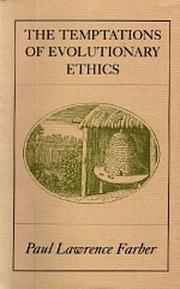| Listing 1 - 10 of 27 | << page >> |
Sort by
|

ISBN: 1107136733 1280430958 0511170424 0511061951 0511206321 0511297491 051161022X 0511070411 9780511061950 9780511170423 9780511070419 9780511610226 9780521529242 0521529247 0521821924 0521529247 9780521821926 9781107136731 9781280430954 9780511206320 9780511297496 Year: 2003 Publisher: Cambridge : Cambridge University Press,
Abstract | Keywords | Export | Availability | Bookmark
 Loading...
Loading...Choose an application
- Reference Manager
- EndNote
- RefWorks (Direct export to RefWorks)
Accepted codes of conduct and established religions are features of human societies throughout the world. Why should this be? In this 2003 book, biologist Donald Broom argues that these aspects of human culture have evolved as a consequence of natural selection; that morally acceptable behaviour benefits the humans and other animals and that a principal function of religion is to underpin and encourage such behaviour. The author provides biological insights drawn especially from work on animal behaviour and presents ideas and information from the fields of philosophy and theology to produce a thought-provoking, interdisciplinary treatment. Scientists who read this book will gain an appreciation of the wider literature on morality and religion, and non-scientists will benefit from the author's extensive knowledge of the biological mechanisms underlying the behaviour of humans and other social animals.
Ethics, Evolutionary. --- Sociobiology --- Ethics, Naturalistic --- Evolutionary ethics --- Naturalistic ethics --- Ethics --- Ethical relativism --- Religious aspects. --- Ethics, Evolutionary
Book
ISBN: 0674063074 9780674063075 9780674061446 0674061446 Year: 2011 Publisher: Cambridge, Mass. Harvard University Press
Abstract | Keywords | Export | Availability | Bookmark
 Loading...
Loading...Choose an application
- Reference Manager
- EndNote
- RefWorks (Direct export to RefWorks)
Principles of right and wrong guide the lives of almost all human beings, but we often see them as external to ourselves, outside our own control. In a revolutionary approach to the problems of moral philosophy, Philip Kitcher makes a provocative proposal: Instead of conceiving ethical commands as divine revelations or as the discoveries of brilliant thinkers, we should see our ethical practices as evolving over tens of thousands of years, as members of our species have worked out how to live together and prosper. Elaborating this radical new vision, Kitcher shows how the limited altruistic tendencies of our ancestors enabled a fragile social life, how our forebears learned to regulate their interactions with one another, and how human societies eventually grew into forms of previously unimaginable complexity. The most successful of the many millennia-old experiments in how to live, he contends, survive in our values today.Drawing on natural science, social science, and philosophy to develop an approach he calls "pragmatic naturalism," Kitcher reveals the power of an evolving ethics built around a few core principles-including justice and cooperation-but leaving room for a diversity of communities and modes of self-expression. Ethics emerges as a beautifully human phenomenon-permanently unfinished, collectively refined and distorted generation by generation. Our human values, Kitcher shows, can be understood not as a final system but as a project-the ethical project-in which our species has engaged for most of its history, and which has been central to who we are.
Ethics, Evolutionary. --- Ethics, Naturalistic --- Evolutionary ethics --- Naturalistic ethics --- Ethics --- Ethical relativism --- Ethics, Evolutionary

ISBN: 0585090114 9780585090115 9780791436943 0791436942 9780791436936 0791436934 0791436934 0791436942 Year: 1998 Publisher: Albany, NY : State University of New York Press,
Abstract | Keywords | Export | Availability | Bookmark
 Loading...
Loading...Choose an application
- Reference Manager
- EndNote
- RefWorks (Direct export to RefWorks)
Ethics, Evolutionary. --- Ethics, Naturalistic --- Evolutionary ethics --- Naturalistic ethics --- Ethics --- Ethical relativism

ISBN: 0585059861 9780585059860 079141499X 0791415007 9780791414996 9780791415009 1438414773 9781438414775 Year: 1993 Publisher: Albany : State University of New York Press,
Abstract | Keywords | Export | Availability | Bookmark
 Loading...
Loading...Choose an application
- Reference Manager
- EndNote
- RefWorks (Direct export to RefWorks)
Ethics, Evolutionary. --- Ethics, Naturalistic --- Evolutionary ethics --- Naturalistic ethics --- Ethics --- Ethical relativism
Book
ISBN: 303068802X 3030688011 Year: 2021 Publisher: Cham, Switzerland : Springer,
Abstract | Keywords | Export | Availability | Bookmark
 Loading...
Loading...Choose an application
- Reference Manager
- EndNote
- RefWorks (Direct export to RefWorks)
Ethics, Evolutionary. --- Ethics, Naturalistic --- Evolutionary ethics --- Naturalistic ethics --- Ethics --- Ethical relativism

ISBN: 0585176507 052092097X 9780520920972 9780585176505 9780520087736 0520087739 0520213696 0520087739 Year: 1994 Publisher: Berkley University of California Press
Abstract | Keywords | Export | Availability | Bookmark
 Loading...
Loading...Choose an application
- Reference Manager
- EndNote
- RefWorks (Direct export to RefWorks)
Evolutionary theory tells us about our biological past; can it also guide us to a moral future? Paul Farber's compelling book describes a century-old philosophical hope held by many biologists, anthropologists, psychologists, and social thinkers: that universal ethical and social imperatives are built into human nature and can be discovered through knowledge of evolutionary theory.Farber describes three upsurges of enthusiasm for evolutionary ethics. The first came in the early years of mid-nineteenth century evolutionary theories; the second in the 1920s and '30s, in the years after the cultural catastrophe of World War I; and the third arrived with the recent grand claims of sociobiology to offer a sound biological basis for a theory of human culture.Unlike many who have written on evolutionary ethics, Farber considers the responses made by philosophers over the years. He maintains that their devastating criticisms have been forgotten-thus the history of evolutionary ethics is essentially one of oft-repeated philosophical mistakes.Historians, scientists, social scientists, and anyone concerned about the elusive basis of selflessness, altruism, and morality will welcome Farber's enlightening book.
Ethics, Evolutionary --- Ethics, Naturalistic --- Evolutionary ethics --- Naturalistic ethics --- Ethics --- Ethical relativism --- History --- History. --- Philosophy --- ETHICS, EVOLUTIONARY --- PHILOSOPHY --- Ethics, evolutionary
Book
ISBN: 0262270021 0585480974 9780262270021 9780585480978 Year: 2003 Publisher: Cambridge, Mass. : MIT Press,
Abstract | Keywords | Export | Availability | Bookmark
 Loading...
Loading...Choose an application
- Reference Manager
- EndNote
- RefWorks (Direct export to RefWorks)
In Natural Ethical Facts William Casebeer argues that we can articulate a fully naturalized ethical theory using concepts from evolutionary biology and cognitive science, and that we can study moral cognition just as we study other forms of cognition. His goal is to show that we have "softly fixed" human natures, that these natures are evolved, and that our lives go well or badly depending on how we satisfy the functional demands of these natures. Natural Ethical Facts is a comprehensive examination of what a plausible moral science would look like. Casebeer begins by discussing the nature of ethics and the possible relationship between science and ethics. He then addresses David Hume's naturalistic fallacy and G. E. Moore's open-question argument, drawing on the work of John Dewey and W. V. O. Quine. He then proposes a functional account of ethics, offering corresponding biological and moral descriptions. Discussing in detail the neural correlates of moral cognition, he argues that neural networks can be used to model ethical function. He then discusses the impact his views of moral epistemology and ontology will have on traditional ethical theory and moral education, concluding that there is room for other moral theories as long as they take into consideration the functional aspect of ethics; the pragmatic neo-Aristotelian virtue theory he proposes thus serves as a moral "big tent." Finally, he addresses objections to ethical naturalism that may arise, and calls for a reconciliation of the sciences and the humanities. "Living well," Casebeer writes, "depends upon reweaving our ethical theories into the warp and woof of our scientific heritage, attending to the myriad consequences such a project will have for the way we live our lives and the manner in which we structure our collective moral institutions."
Ethics, Evolutionary --- Ethics --- Philosophy --- Philosophy & Religion --- Ethics, Naturalistic --- Evolutionary ethics --- Naturalistic ethics --- Ethical relativism --- Ethics, Evolutionary. --- PHILOSOPHY/General --- COGNITIVE SCIENCES/General

ISBN: 9780521870320 0521870321 9780511550997 9780521152693 9780511508073 0511508077 1107179904 0511550995 0511503997 0511508735 0511506139 0521152690 Year: 2007 Publisher: Cambridge : Cambridge University Press,
Abstract | Keywords | Export | Availability | Bookmark
 Loading...
Loading...Choose an application
- Reference Manager
- EndNote
- RefWorks (Direct export to RefWorks)
It is certainly the case that morality governs the interactions that take place between individuals. But what if morality exists because of these interactions? This book, first published in 2007, argues for the claim that much of the behaviour we view as 'moral' exists because acting in that way benefits each of us to the greatest extent possible, given the socially structured nature of society. Drawing upon aspects of evolutionary game theory, the theory of bounded rationality, and computational models of social networks, it shows both how moral behaviour can emerge in socially structured environments, and how it can persist even when it is not typically viewed as 'rational' from a traditional economic perspective. This book also provides a theory of how moral principles and the moral sentiments play an indispensable role in effective choice, acting as 'fast and frugal heuristics' in social decision contexts.
Ethics, Evolutionary. --- Moral development. --- Ethics, Naturalistic --- Evolutionary ethics --- Naturalistic ethics --- Ethics --- Ethical relativism --- Ethical development --- Child psychology --- Moral education --- Faith development --- Arts and Humanities --- Philosophy
Book
ISBN: 9780521192422 9781139204385 1139204386 0521192420 9781139205962 113920596X 9780511894633 0511894635 9781139202978 9781107677777 1139199366 1107223156 1280484241 9786613579225 1139205161 1139202979 1139201565 1107677777 Year: 2012 Publisher: Cambridge : Cambridge University Press,
Abstract | Keywords | Export | Availability | Bookmark
 Loading...
Loading...Choose an application
- Reference Manager
- EndNote
- RefWorks (Direct export to RefWorks)
Ethical naturalism is narrowly construed as the doctrine that there are moral properties and facts, at least some of which are natural properties and facts. Perhaps owing to its having faced, early on, intuitively forceful objections by eliminativists and non-naturalists, ethical naturalism has only recently become a central player in the debates about the status of moral properties and facts which have occupied philosophers over the last century. It has now become a driving force in those debates, one with sufficient resources to challenge not only eliminativism, especially in its various non-cognitivist forms, but also the most sophisticated versions of non-naturalism. This volume brings together twelve new essays which make it clear that, in light of recent developments in analytic philosophy and the social sciences, there are novel grounds for reassessing the doctrines at stake in these debates.
Ethics, Evolutionary --- Naturalism --- Materialism --- Mechanism (Philosophy) --- Philosophy --- Positivism --- Science --- Ethics, Naturalistic --- Evolutionary ethics --- Naturalistic ethics --- Ethics --- Ethical relativism --- Ethics, Evolutionary. --- Naturalism. --- Arts and Humanities

ISBN: 1452233608 1452264457 9781452264455 9781452233604 9780761923893 0761923896 Year: 2003 Publisher: Thousand Oaks, Calif. ; London : SAGE,
Abstract | Keywords | Export | Availability | Bookmark
 Loading...
Loading...Choose an application
- Reference Manager
- EndNote
- RefWorks (Direct export to RefWorks)
The author explores moral development through the theories of Kohlberg & Hoffman, contributing to the broad dialogue on the question & nature of moral development & behaviour, as well as providing an introduction to these theories.
Moral development. --- Ethics, Evolutionary. --- Ethics, Naturalistic --- Evolutionary ethics --- Naturalistic ethics --- Ethics --- Ethical relativism --- Ethical development --- Child psychology --- Moral education --- Faith development --- Moral development
| Listing 1 - 10 of 27 | << page >> |
Sort by
|

 Search
Search Feedback
Feedback About
About Help
Help News
News